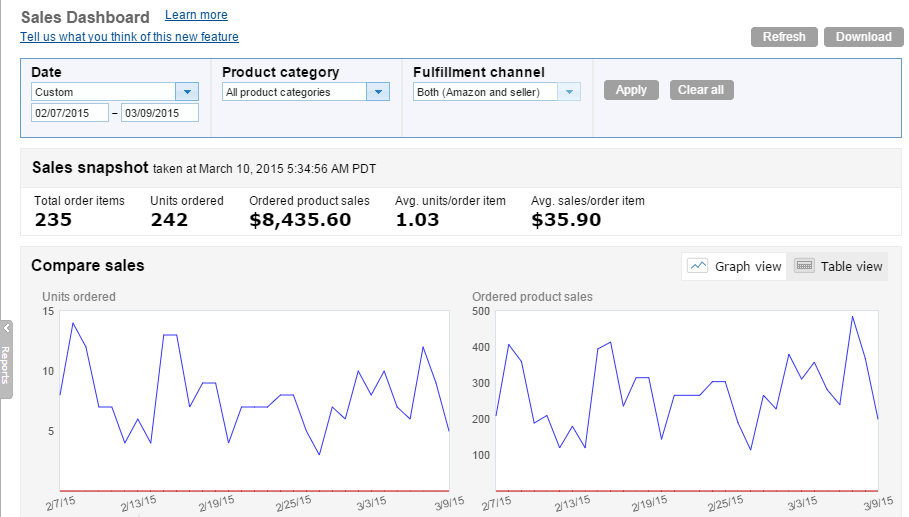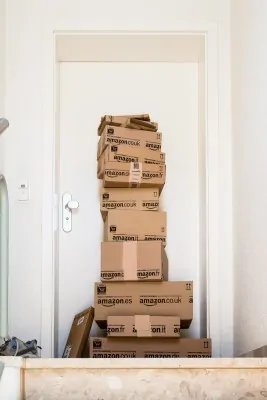Today’s post will be a little bit different, as it is a guest post from Brent & Laura Carr who are fellow sellers that I have met in Minneapolis. They started off in the retail arbitrage business model, and recently transitioned over to private labeling their own products on amazon. As mentioned in my past couple of results posts, I’ve been working on how to sell on Amazon private label as well, and should have my first private label product live on amazon this month. Brent & Laura are further along in the process however, and are seeing some good success in their first few months. They were willing to do a guest post sharing some of their experiences, as well as some of the differences between retail arbitrage in today’s post. You can expect some more posts about private label here over the coming months as well.
Take it away Laura:
A few weeks back, Brent + I had the fun opportunity to swap seller success stories over steak with Ryan Grant of Online Selling Experiment. 🙂
Besides being a generally cool guy, Ryan’s running a killer Amazon FBA operation. In his mid-20s, he’s already been able to quit his corporate accounting job, hire a couple part-time helpers, and make his full-time living off of Amazon doing primarily “retail arbitrage” where he buys discounted products and resells them on Amazon.
We first got in contact with Ryan when we were doing retail arbitrage through Amazon FBA, which was a great on-ramp to what we do now — which is private label our own brand of products. Sounds like Ryan’s looking into this as well, so we thought we’d offer up some insight into the private-label side of Amazon selling.
What is Amazon’s Private Label?
Private labeling for Amazon FBA means you sell (existing) products of your choosing, under your own private brand (label) on Amazon. After studying a product/market, you contact product suppliers/manufacturers directly, and they make the product for you, in bulk, at cost, under your brand name. They then ship the product, ready to sell, to Amazon. Assuming you’ve done your part in diligent research and strategic polishing, your product sells insanely well, and you hardly have to lift a finger… except to type.
All the work can be done from behind your laptop or mobile device — that is, from your location flavor of the day (coffee shop, kitchen table, Bahamas, desk job, etc).
Private Label vs. Retail Arbitrage
What types of products does the FBA seller sell on Amazon?
PL: Repeat sales of the product(s) of Seller’s own brand
RA: Sales of all different types, varieties, and brands of products
Where does the Seller find/get/source the products they FBA/sell on Amazon?
PL: Seller’s order placed directly with a manufacturer — for the product(s) Seller chooses to private-label
RA: Seller’s ongoing effort at finding deals and making purchases via various online, warehouse or retail locations
What takes bulk of Seller’s time/effort?
PL: Seller puts an initial (one-time) effort into:
- Picking product/supplier
- Launching brand + product
Seller puts some continual effort into
- Managing inventory
- Providing customer service
RA: Seller puts continual effort to:
- Finding deals
- Making inventory purchases
- Prepping, packaging, listing, shipping items
- Managing inventory
What determines quantity of product units Seller can purchase?
PL: Seller-defined budget
RA: Product availability + Seller-defined budget
Who preps/packs/ships the products to Amazon?
PL: Manufacturer (…or you, the Seller, if you really want to)
RA: Seller
What’s the potential risk if product doesn’t sell?
PL: Medium-High — assuming Seller investment is usually in a large quantity of just 1 type of product
RA: Low — assuming Seller investment is diversified across a large variety of lower-priced products
What’s the income potential?
PL: High — low inventory per-unit purchase cost, Seller sets (his/her own) profit margins + operation is largely scalable. Seller is building a legitimate business selling products of a brand he/she owns, simultaneously creating brand value that could later be sold.
RA: Limited — variable inventory per-unit purchase cost, variable profit margins, ability for other Sellers to undercut price + operation has limited scalability due to time and effort. Seller is just reselling other brands.
Month Two Sales Capture FOR 1 Private-Label Product
Our actual profit margin: 50%

Brent & Laura Carr
come from modest roots in small-town SD & MN. They both value quality time together and shared life experience over canned job titles or salaries. They put their inner entrepreneurs to work, vowing to work smarter, live harder, and thrive together by working for and with each other.
Family, friends, colleagues and strangers started asking questions on how they too could get started in Amazon FBA selling. And so, Brent & Laura started The Thriving Couple, where they coach other local everyday entrepreneur couples on how to grow their own business of private-labeling products to sell on Amazon.
Header image courtesy of Franky242 of FreeDigitalPhotos.net
Thank you to Laura & Brent for sharing their experience so far with their private label journey. If you have any questions for them please feel free to check out their site, or leave a comment below. Thanks for reading!


Hello,
Great story and information. Can you see a place for a sheltered workshop somewhere in this process with packaging, shrink wrapping, labeling or kitting? We provide employment for adults with developmental disabilities. It would be great to branch off onto a path that has not been taken on in our industry.
Hi Kelly,
What you are describing sounds a lot like a “Prep Center”. Are you familiar with this concept? They are very popular and may be worth looking into as something to set up. Here is a post about them:
Amazon FBA Prep Service Guide + MEGA List
how can I get more reviews for my new private label product? Is there a website you recommend?
How do you market your private label products?
Hi Zacharie,
There are a number of worthwhile strategies and approaches that provide options for getting reviews and marketing products. Complete answers to your questions is more than what I can rapid-fire off in a quick response (part of why we train full sessions on both these topics). Real quick tho —
Setting up a giveaway to family and friends that offers your product for free/highly discounted price is one of the best ways to get reviews rollin. Since it is your family and friends (who can sometimes be eager …or not as eager… to comply), you’ll want to stress to them that it’s imperative they leave a review. There are a myriad of websites out there that can be used to get your board in front of reviewers as well, though we’re not personally fans of some of the more sly ways of “purchasing” reviews.
I’ll assume by “market” you are wondering what we do to advertise/promote our product. Again, there are a number of channels and means for doing this out there, including Amazon ads, FBook ads, affiliates, etc.
Best of luck to you and your PL product!
I’m really looking into private label and have contacted a supplier… waiting on samples. How do you get your items from supplier to amazon fba docks? Private courier, dhl, fed ex?
Hi Anthony,
Is your supplier in the US? if so, you can arrange for UPS to pick up your inventory/shipment when it’s ready and bring it to Amazon. This is definitely the cheapest route as you can use Amazon’s very discounted prices for shipping.
Hope that helps!
I’ve heard the private label thing tossed around and it definitely is intriguing. Congratulations on your rapid success! How did you perform your initial due diligence to make sure you weren’t infringing on someone’s patent/Intellectual Property?
Thank you for your kind words, Eric. This is a pertinent question — anyone going into private labeling does need to research whether a patent exists or is pending for a product. We did our due research (patents/trademarks are public info). In addition, our product is a commodity item (e.g., we didn’t private label something like an Aeropress, patented in its very design). We also tailored specific features of our product to make it “ours” and distinguish it enough to be sure it wouldn’t be a replica of any another product.
That’s awesome! Can’t wait to read about how your new journey is going to go. I wrote this post I think you might find helpful: https://www.feedbackz.com/blog/amazon-success-story-how-i-went-from-0-to-50000-dollars-month-in-8-months/
Thanks James, and I will check that link out.
Best Regards,
Ryan
do the private label products still need amazon labels? Will the manufacturer do that as well?
Hi Joe,
Great question.
Yes, the PL product will still needs an Amazon barcode label. You can have the manufacturer adhere these, or pay Amazon per unit to do it, do it yourself (by having the product shipped to you first), or possibly even build the barcode into your printed product label.
Personally, we do the first of those options.
Hope that helps!
Hi Ash,
Great question — and you’re absolutely right. Shipping a product directly to Amazon does pose the exact risk you mentioned.
Some private labelers do choose to have the inventory shipped to them, first, so they can personally verify the products. Then they ship the inventory into Amazon.
Personally, we did order (multiple) samples from the supplier and we also got some candid (non professional) pictures of the product while it was undergoing specification changes + production. We did research and vet our supplier quite a bit ahead of time (and found out they supplied major chains like Target and Costco) so we felt confident in their quality.
Thanks for the insight. If you have your supplier ship directly to amazon for you then how do you stay on top of quality control? Do you have the manufacturer still ship you random samples to check or do you do small random removal orders from amazon to ensure the quality is right? If there is a problem during manufacturing and it all goes to amazon for sale then that could potentially create problems for customers and your account very quickly.
Hi John,
You can definitely follow the details of our PL adventures — we regularly chronicle them on our blog http://www.thethrivingcouple.com/follow and on our FB page http://www.facebook.com/thethrivingcouple
Hope you find it useful (or at least entertaining)!
Hi Ash,
Great question — and you’re absolutely right. Shipping a product directly to Amazon does pose the exact risk you mentioned.
Some private labelers do choose to have the inventory shipped to them, first, so they can personally verify the products. Then they ship the inventory into Amazon.
Personally, we did order (multiple) samples from the supplier and we also got some candid (non professional) pictures of the product while it was undergoing specification changes + production. We did research and vet our supplier quite a bit ahead of time (and found out they supplied major chains like Target and Costco) so we felt confident in their quality.
More interesting to hear more details of their adventure, cost wise, length of time to sell, etc. PL is nothing more than wholesaling. Nothing new there.
Hi John,
You can definitely follow the details of our PL adventures — we regularly chronicle them on our blog: https://www.thethrivingcouple.com/follow
and on our FB page:
https://www.facebook.com/thethrivingcouple
Hope you find it useful (or at least entertaining)!